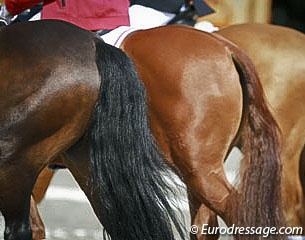
For ages, everyone has believed that muscle acidification is caused by the production of lactate in the muscles during intense work. Research in the last decade has shown that muscle acidification is a more complex process. Although scientists still disagree about the exact cause of muscle acidification, lactate seems to be a part of normal muscle function.
Lactate produced in the muscles during anaerobic work – or work done without oxygen, such as sprinting or jumping - can be used as a source of energy by other muscles in the body. The efficiency of this process can be reinforced by training. Anaerobic work causes muscles to burn the stored muscle glycogen – or carbohydrates stored by the body for later work - and produce lactate as a by-product. However, not all the muscles in the body work anaerobically at the same time. The muscles working with the help of oxygen are said to be doing aerobic work. A fit horse can use the lactate produced by anaerobic working muscles as a source of energy for some aerobic working muscles. That way the lactate can cause extra energy for these muscle instead of causing muscle fatigue.
Training and conditioning helps make the uptake and use of lactic acid by aerobic muscles more efficient. A fit horse has a more efficient circulatory system – as in the heart, arteries, and veins - which in turn makes the transport of lactic acid from anaerobic working muscles to aerobic working muscles easier. An unfit horse cannot easily utilize the anaerobically-produced lactic acid, which can cause a build-up of lactic acid in the body. During heavy work, this build up can cause muscle acidification.
Tips to avoid muscle acidification:
- Cool your horse down properly to give your horse the time to work away the lactic acid.
- Replace some of the sugars and starches in your horse’s diet with high-quality fats and fiber.
- Make sure your horse is fit for the level of work you are performing.
- Give your horse sufficient water, electrolytes, and antioxidants (like Vitamin E) after heavy work to prevent muscle acidification.
Feed supplements like Cavalor® Muscle Liq and Cavalor® Muscle Fit to help reduce the effects of muscle fatigue and improve recovery times.
Check out a video on muscle acidification here.
www.cavalor.com or visit Cavalor on Facebook
